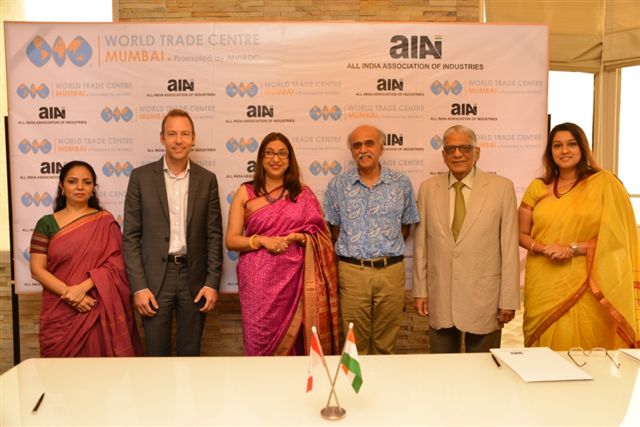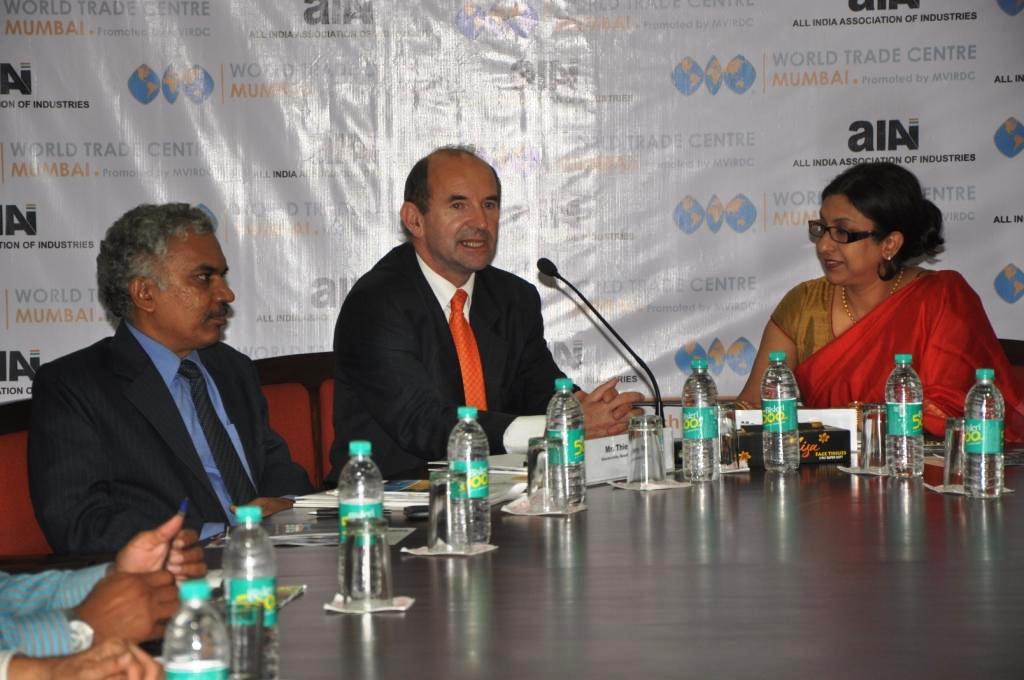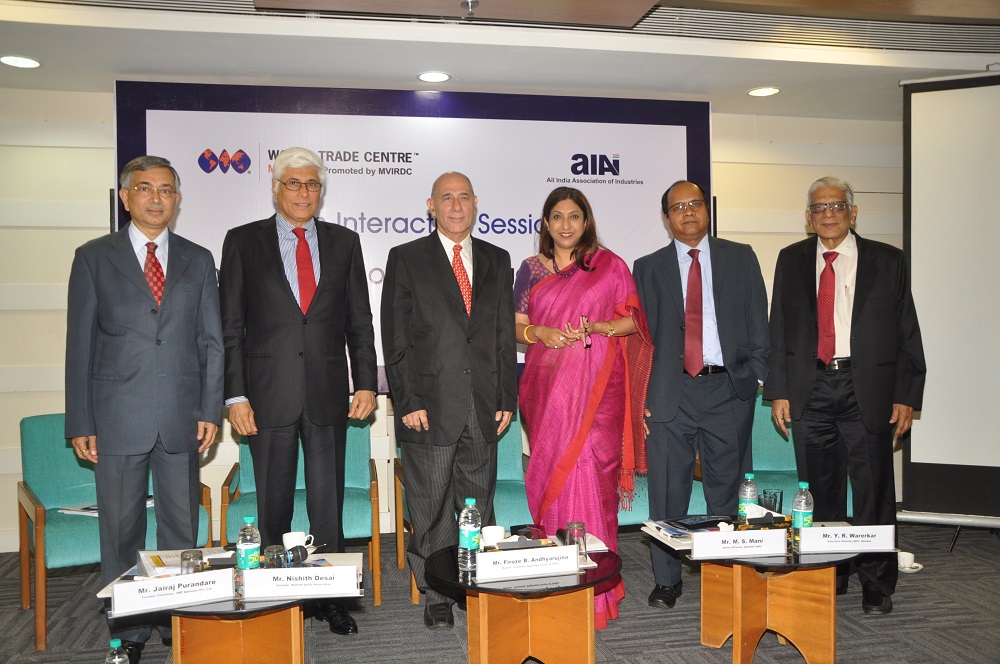- Home
- About
- Team
- About the President
- Mission
- Advisory bodies
- Associates
- Privacy Policy
- Terms and Conditions
- Cancellation, Returns & Refund Policy
- Pricing Policy
- Services
- Activities
- Events
- International Desk
- Sectors
- MSME
- Membership
- Publication
- Media
- Contact
“The Asian economy has much to offer to the globe. The Asian continent has a demographic advantage being home to a young, skilled and productive work force. Secondly, the continent boosts of a pool of natural resources which needs to be tapped to give impetus to its manufacturing.[…]
Read More“Maharashtra is the second largest province of India. It is home to Mumbai – the economic and commercial capital of the nation. Maharashtra is the favoured investment destination of the country with conducive business environment and ready availability of land, power, water, connectivity and skilled labour. We invite[…]
Read More
Mr. Vijay Kalantri, President-All India Association of Industries (AIAI) with Hon/L’Hon Tony Clement P.C. M.P, President of the Treasury Board and Minister for Finance, Trade and Commerce, Government of Canada at meeting in Mumbai. Hon/L’Hon Tony Clement P.C. M.P, President of the Treasury Board and Minister for Finance,[…]
Read More
The book `Innovation Sutra’, based on the teachings of the Buddha, is about instant transformation serving as a guide to work-life balance. Just as a drop of water gets transformed when touched by a ray of sunlight or seed, given the right proportion of nutrients, transforms into a[…]
Read More
The BRISC-CARR Group Inc. works towards building employable skills in the unemployed and under employed. The Group looks forward to joining hands with MVIRDC World Trade Centre and All India Association of Industries in reaching its goals. Thus, MVIRDC World Trade Centre and BRISC-CARR Group Inc and All India Association of Industries[…]
Read More
Inaugurating the NSIC online e-commerce shopping portal, www.msmeshopping.com Shri Kalraj Mishra, Minister, MSME appreciated the efforts of NSIC in launching their B2C portal, which is one of its kinds as MSMEs shall be able to sell Retail products as well as Industrial equipment/machineries online. Shri Kalraj Mishra, Minister,[…]
Read More
“The Government of India has set up a project monitoring group to fast track projects worth Rs 1,000 crores. The group tasked with the job of clearing 449 projects worth Rs 22 lakh crores has successfully resolved 163 projects worth Rs 5.7 lakh crores”, said Mr. Anil Swarup,[…]
Read More
“Euro India Technology Sourcing (EITS) is a business meeting aiming to establish new contacts between companies from India and Europe interested to develop and boost strong trade relations in the field of materials, processes and energies. EITS is a part of the public strategy for the development of a European Materials and[…]
Read More
“The Union Budget 2014-15 has one too many favourable provisions for the common man. The Budget encompasses reforms to upgrade diverse sectors of the economy by undertaking development programmes. It has signaled growth as a top priority of the Government thereby improving the investment climate for domestic and[…]
Read More“The Union Budget 2014-15 has failed to meet the expectations of the industry. Finance Minister Mr. Arun Jaitley has lost a golden opportunity of reviving the prospects of the Indian economy succumbing to decadal low GDP growth, inflation, crowding out of private investments and rising deficit bill”, said[…]
Read MoreRecent Posts
- Press Release : All India Association of Industries and World Trade Center Mumbai and TERI Advance Dialogue on India’s Low-Carbon Transition 17th Feb 2026
- All India Association of Industries and World Trade Center Mumbai Welcomes Historic India–EU Trade Agreement; Calls It a Defining Moment for Global Economic Partnership 17th Feb 2026
- 77th Republic Day Celebrations at WTC Mumbai: Honoring Viksit Bharat and Ecoconomic Triumphs 17th Feb 2026
Categories
- Agriculture
- Banking and finance
- Biotechnology
- Business Process Outsourcing
- Chemicals
- Defence
- Drugs & Pharmaceuticals
- Economic Affairs & Taxation
- Energy
- Engineering
- Exports & Imports
- Food Processing
- Food Processing
- ICTE Manufacturing
- Inbound delegation
- Information & Communication Technology
- Infrastructure
- Innovation
- Logistics
- Manufacturing
- Media & Entertainment
- Medium & Small Scale Industry
- Micro
- Oil and Gas
- Petrochemicals
- Ports
- Power
- Press Information Bureau-Government of India
- Press Release
- Press Release: Quanzhou Delegation Explores Business Collaboration in India
- Renewable Energy
- Tourism & Hospitality
- Uncategorized
- Women Empowerment
Archives
- February 2026
- December 2025
- October 2025
- July 2025
- June 2025
- April 2025
- March 2025
- January 2025
- December 2024
- June 2024
- May 2024
- April 2024
- March 2024
- January 2024
- November 2023
- October 2023
- September 2023
- August 2023
- July 2023
- June 2023
- May 2023
- April 2023
- March 2023
- February 2023
- January 2023
- February 2022
- January 2022
- December 2021
- November 2021
- October 2021
- September 2021
- August 2021
- July 2021
- June 2021
- May 2021
- April 2021
- March 2021
- February 2021
- January 2021
- December 2020
- November 2020
- September 2020
- August 2020
- June 2020
- May 2020
- April 2020
- March 2020
- February 2020
- January 2020
- November 2019
- August 2019
- July 2019
- May 2019
- April 2019
- March 2019
- July 2018
- June 2018
- April 2018
- February 2018
- January 2018
- December 2017
- November 2017
- October 2017
- September 2017
- August 2017
- July 2017
- June 2017
- May 2017
- April 2017
- March 2017
- February 2017
- January 2017
- December 2016
- November 2016
- October 2016
- September 2016
- August 2016
- July 2016
- June 2016
- May 2016
- April 2016
- March 2016
- February 2016
- January 2016
- December 2015
- November 2015
- October 2015
- September 2015
- August 2015
- July 2015
- June 2015
- May 2015
- April 2015
- March 2015
- February 2015
- January 2015
- December 2014
- November 2014
- October 2014
- September 2014
- August 2014
- July 2014
- June 2014
- May 2014
- April 2014
- March 2014
- February 2014
- January 2014
